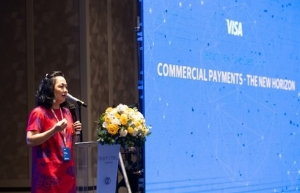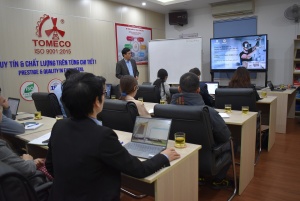Going digital the answer to withstand global fluctuations
Can you tell us about ACB’s current digital transformation plan?
 |
| ACB chairman Tran Hung Huy (left) and CEO Tu Tien Phat |
Phat: ACB is currently implementing its 2019-2024 strategy, while also setting a three-year vision. The bank aims to continue developing a selective new customer base and identify appropriate market segments. In terms of digital transformation, we are focusing on several areas: specialised digital banking, digitising all business processes, providing products for customers, applying AI, and using data collection and analysis more extensively.
At the same time, ACB is optimising its resources and transitioning its business operations to suit the macroeconomic environment. We plan to announce specific distribution channels in the near future. Digital bank ACB One is growing at 80 per cent per year, with 95 per cent of customers shifting to digital channels.
ACB is developing a specialised business model for digital banking and partnering with fintech companies, while continuing to negotiate with other partners to accelerate customer growth.
Regarding the business sector, the bank’s personal loan growth was over 20 per cent in previous years, but is expected to be only 12-13 per cent this year. Among its personal loan portfolio, 40 per cent are for business operations. In addition, we remain committed to aiding loans for small- and medium-sized enterprises.
Are there any plans for ACB to purchase another bank or open foreign branches?
Huy: When initiating mergers and acquisitions, we must consider the value it will bring to the organisation and whether the operation is aligned with its strategic direction. ACB has evaluated potential acquisitions recently, but has not identified a suitable candidate. The bank will continue to assess the market and evaluate any potential opportunities that may arise.
Domestic development remains our top priority, and there are currently no plans to establish foreign branches.
Before the pandemic, we had a potential suitor that showed their interest in acquiring a stake in our securities arm ACBS, but the agreement fell through. Currently, we will continue to seek for collaborations to bolster our further expansion.
ACB has announced its plan to expand its business segment by introducing commodity derivatives and custodian banking services. What is the strategy for this?
Phat: This strategic move is to raise the proportion of the fee and service segment, reduce the reliance on interest, and promote toll collection.
Although the commodity derivatives business is not new to ACB and the bank has performed several transactions in compliance with the regulations of the State Bank of Vietnam, it is still considered a specialised activity related to trading foreign goods.
Furthermore, while supervisory banking is a common practice in the international market, only a few banks in Vietnam are qualified to offer this. In addition to the proposed commodity derivatives service, ACB has signed an exclusive insurance contract with Sun Life Vietnam as part of its plan to offer custodial banking.
In 2023, the bank set a target of pre-tax profit of $853 million, up 17.2 per cent on-year, while the bad debt ratio is expected at below 2 per cent.
ACB is also one of the few commercial banks that has such a conservative bond portfolio, consisting of around 85 per cent of government bonds, other credit institution bonds, and no corporate bonds. ACB also completed stringent risk management requirements in line with Basel III and ILAAP standards in 2022.
How do you assess the environmental, social, and governance (ESG) trend in the banking sector?
Huy: We have formulated several initiatives in response to current market conditions. Our indices for safety are high, despite lower credit growth compared to last year. For example, we target to foster our card business segment, which generates stable revenue. In Q1/2023, ACB’s growth rate of international cards was 78 per cent compared to 34 per cent of the whole industry, accounting for 8.1 per cent of the international card market share. This is expected to be a major source of revenue in 2023.
Furthermore, sustainability has become a topic of crucial importance for every industry, including the financial market. This year, we will ramp up our efforts to embed sustainability, ESG criteria into our core business and operation, and apply such requirements for loans.
We are committed to fully complying with ESG. We are striving to create an integrated strategy and design specific ESG initiatives for our business, and for our clients. This could contribute to Vietnam’s ambitious target of achieving net-zero emission by 2050.
 | B2B digital payment accelerates In Vietnam, business-to-business (B2B)-focused fintech presents new revenue and growth streams for enterprises of all sizes, experts said. |
 | Supporting businesses to build a digital transformation roadmap The Ministry of Planning and Investment with United States Agency for International Development (USAID) has been deploying activities to support businesses in building a digital transformation roadmap. |
 | Standard Chartered Vietnam partners with MISA to launch digital financing for SMEs Standard Chartered Vietnam announced the launch of its strategic partnership with MISA JSC on April 14, witnessed by the management teams from both companies, clients, and journalists. This first-in-market partnership offers unsecured invoice financing facilities to small- and medium-sized enterprises (SMEs) in Vietnam with a highly competitive interest rate and straight-forward process. |
What the stars mean:
★ Poor ★ ★ Promising ★★★ Good ★★★★ Very good ★★★★★ Exceptional
Related Contents
Latest News
More News
- Private capital funds as cornerstone of IFC plans (February 20, 2026 | 14:38)
- Priorities for building credibility and momentum within Vietnamese IFCs (February 20, 2026 | 14:29)
- How Hong Kong can bridge critical financial centre gaps (February 20, 2026 | 14:22)
- All global experiences useful for Vietnam’s international financial hub (February 20, 2026 | 14:16)
- Raised ties reaffirm strategic trust (February 20, 2026 | 14:06)
- Sustained growth can translate into income gains (February 19, 2026 | 18:55)
- The vision to maintain a stable monetary policy (February 19, 2026 | 08:50)
- Banking sector faces data governance hurdles in AI transition (February 19, 2026 | 08:00)
- AI leading to shift in banking roles (February 18, 2026 | 19:54)
- Digital banking enters season of transformation (February 16, 2026 | 09:00)

 Tag:
Tag:



















 Mobile Version
Mobile Version